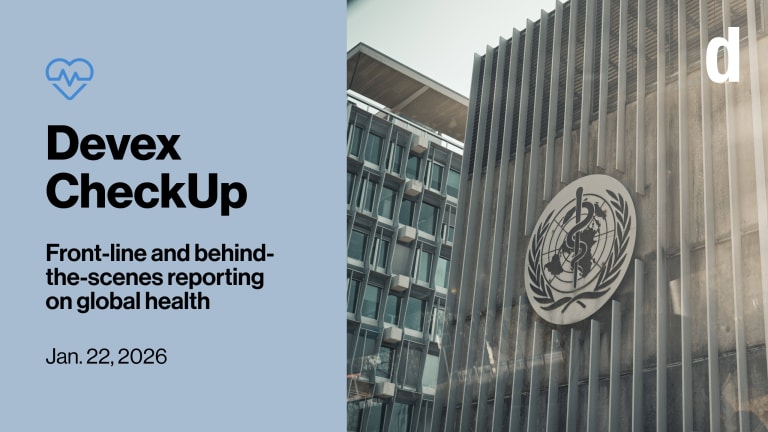
GENEVA — The next two weeks will tell whether a vaccination campaign and public health measures can stop the Ebola outbreak in the Democratic Republic of the Congo from “exploding” in urban centers and spreading to other countries, according to a top World Health Organization official.
Aid groups respond in DRC as Ebola city cases confirmed
Until recently, the current Ebola outbreak in DRC — confirmed by WHO on May 8 — had been restricted to remote villages in the Bikoro region. However, the confirmation of cases in a major city situated along the Congo River is cause for alarm.
Peter Salama, deputy director-general of emergency preparedness and response, told Devex on the sidelines of the World Health Assembly that confirmation last week that the virus had reached Mbandaka — a city of about 1 million people on the Congo River, which leads to the capital Kinshasa — meant the situation was now “on an epidemiological knife-edge.”
Cases had previously been confined to more remote villages, where it was considered easier to contain.
“All it takes is one sick person to be transported down that river,” Salama said Tuesday. “Think of it as a highway because it’s the only real transportation mode in that area of DRC. So it only takes one sick person to go down that highway on a boat and end up faraway for another epicenter of infection to be established.”
Quarantine measures risk sending victims underground and away from the reach of health authorities, Salama said. Surveillance to check people’s temperatures and triage potential Ebola cases for further tests were more effective, he added, with 80 checkpoints being established on the Congo River.
Salama said there are now 51 cases in DRC and 28 deaths in three locations in the country’s northwest, including Mbandaka.
A “ring vaccination” campaign began Monday targeting everyone who has lived with or visited a confirmed Ebola sufferer during the current outbreak, and the contacts of those contacts. Salama said the plan was to vaccinate around 1,000 people in the next week. But response efforts are facing logistical challenges: the country’s underdeveloped health system; remote, forested terrain; and the need to keep the vaccines between -60 and -80 degrees Celsius in areas often without power.
“We have to sit and get individual informed consent from every person that is volunteering to take the vaccine. If people say no we simply don’t vaccinate.”
— Peter Salama, WHO deputy director-general of emergency preparedness and responseIn addition, the vaccine is yet to be licensed, meaning strict ethical protocols must be followed before it can be administered. “We have to sit and get individual informed consent from every person that is volunteering to take the vaccine … If people say no we simply don’t vaccinate,” Salama said. “So that takes a while to explain. You can imagine for a rural population, many of whom are illiterate, to explain that this is an investigational product, that it might have some side effects — even though we know it is a very safe and effective vaccine.”
A predominantly governmental team from Guinea, one of the countries worst hit by the Ebola outbreak in 2014, is in DRC to help with the response, along with around 100 WHO staff and those from Médecins Sans Frontières, UNICEF, World Food Programme, and the Red Cross.
Salama welcomed the show of solidarity from the Guineans, “who are about the only people in the world who’ve ever conducted ring vaccinations for Ebola,” he said.
WHO initially asked for $26 million from donors to help contain the outbreak. Salama said he was “pretty confident” of reaching that amount, given the call is now about 50 percent funded, with informal pledges also coming in. However, he said the ask was likely to rise, as the initial figure was calculated before the spread to Mbandaka.
“As I said to many donors in the last few days: whether it becomes $25 or $50 or $60 million, what we really need to do is save lives and prevent escalation now,” he said. “Not only is that the right thing to do, but it’s the smart thing to do. Remembering that in West Africa, Ebola cost between $3 and $4 billion, so we’re still talking about less than 1 percent of that response.”
The 2014 Ebola outbreak was a searing experience for the U.N. health agency, which was widely criticized for responding too slowly. That has fueled a drive from the WHO’s new director-general, Tedros Adhanom Ghebreyesus, to act more quickly and effectively this time.
“He’s an extremely hands-on manager, so he’s very engaged,” said Salama, who has also been speaking by phone several times a day with the government of DRC. “He’s basically engaged on an hourly basis with me, so we’re in constant communication about this.”
Devex is on the ground at the 71st World Health Assembly in Geneva. Follow reporters @JennyLeiRavelo and @vchadw for updates, and keep an eye out for more stories to follow.








